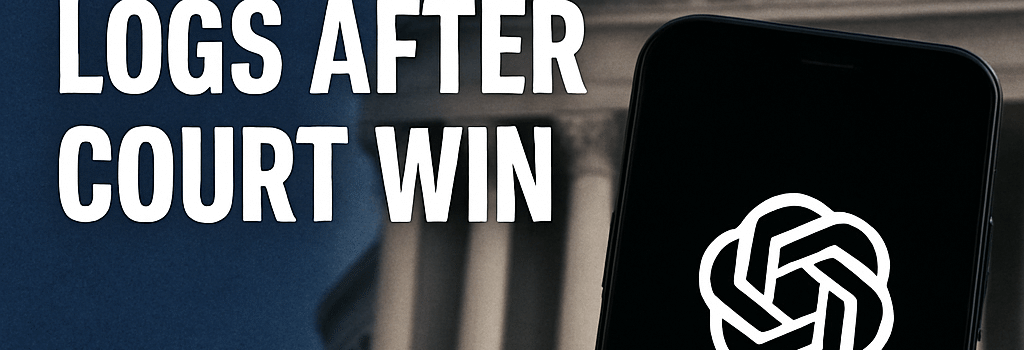NYT to Search Deleted ChatGPT Logs After Court Win

Last week, a federal judge denied OpenAI’s bid to purge an order requiring the company to retain all ChatGPT conversations—including those users delete—indefinitely. That ruling clears the way for The New York Times and other news plaintiffs to begin querying retained logs as part of their copyright litigation against OpenAI.
Background: Court’s Decision Forces Indefinite Log Retention
Magistrate Judge Ona Wang issued the preservation order days after The New York Times and allied media organizations filed an urgent motion, arguing that ChatGPT users likely deleted chats in which they attempted to bypass paywalls. OpenAI appealed to US District Judge Sidney Stein, claiming that indefinite log retention contravened “long-standing privacy norms.” Stein overruled OpenAI, pointing to the company’s user agreement, which disclaims that data may be held for legal proceedings.
Technical Architecture of ChatGPT Logging
Data Capture and Storage
- Session Recording: Every API call and web session is logged. Inputs, model parameters (e.g., temperature, max_token_count), and model outputs are immutably recorded.
- Storage Backend: Logs are persisted on encrypted Amazon S3 buckets (AES-256 encryption) and cataloged in DynamoDB indices for low-latency retrieval.
- Metadata Indexing: User identifiers are hashed (SHA-256) and salted; timestamp indexes and request digests allow targeted queries without exposing raw PII.
Indexing and Search Mechanisms
To comply with e-discovery, OpenAI engineers have proposed a keyword‐filter pipeline. Logs matching agreed-upon terms—such as “New York Times,” “paywall,” or specific article slugs—will be flagged. Anonymized snippets will be loaded into a secure enclave built on AWS Nitro enclaves, ensuring that only minimal, redacted data is ever exposed to plaintiffs’ counsel.
Privacy and Security Implications
Encryption at Rest and In Transit
- Data at Rest: AES‐256 encryption with AWS Key Management Service (KMS) rotating keys every 90 days.
- Data in Transit: TLS 1.3 endpoints for all API and UI traffic, enforcing forward secrecy.
Anonymization and Data Minimization
Despite indefinite retention, OpenAI pledges to hash user IDs and strip obvious PII fields before any external review. Still, privacy advocates warn that even redacted logs can be deanonymized when combined with metadata or other leaks.
“Preserving billions of chat sessions may chill user behavior,” said Jay Edelson, a leading consumer-privacy attorney. “Even if only a fraction are queried, the looming threat changes how people interact with AI.”
Impact on AI Development and User Trust
From an engineering standpoint, indefinite data retention can bloat storage bills and complicate model retraining pipelines. OpenAI’s internal guidelines recommend purging transient logs older than 30 days to optimize performance. This court order now forces a significant rewrite of data-lifecycle policies, potentially delaying feature rollouts and driving costs higher.
Legal Precedents and Future Litigation
Observers note this ruling may serve as a template for other AI litigation. If courts elsewhere mandate broad data freezes, companies like Google, Anthropic, and Meta will face similar demands to preserve conversational or prompt logs. Experts foresee an uptick in e-discovery motions in both civil and criminal cases involving generative AI outputs.
Additional Analysis: Cross-Platform Effects and Market Dynamics
If rival services such as Anthropic’s Claude or Google’s Gemini are spared, users could migrate to platforms with more robust deletion guarantees. That shift may distort competition, prompting regulators to evaluate whether judicial orders are inadvertently shaping market share.
Expert Opinions and Industry Reactions
- Corynne McSherry (EFF): “Retained logs could be subpoenaed in unrelated cases—jeopardizing user confidentiality beyond this copyright suit.”
- AWS Security Engineer: “Nitro enclaves provide hardware-rooted isolation, but law firms often lack comparable safeguards, raising breach concerns.”
- Cryptographer Dr. Lina Pham: “Hashing alone isn’t foolproof; adversaries can leverage side-channel or traffic-analysis attacks to reidentify users.”
Conclusion
The New York Times’ forthcoming search of deleted ChatGPT logs represents a landmark moment in AI data privacy and copyright enforcement. While the scope of logs to be queried will be limited to keyword hits, the precedent of indefinite retention—and the attendant security and trust challenges—will reverberate across the tech industry for years to come.